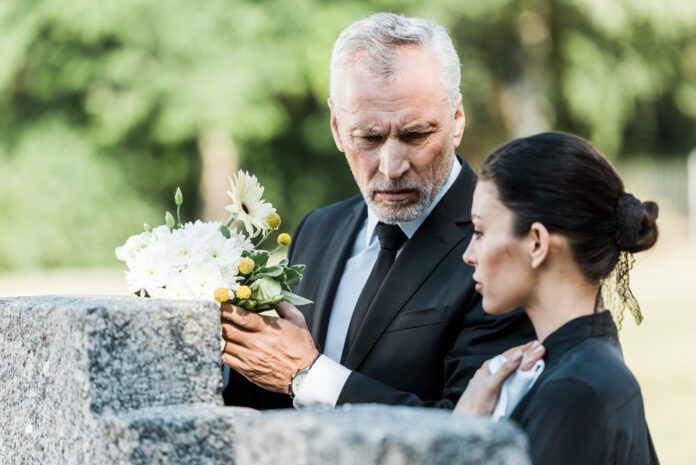What is loss? Loss is the fact or process of losing something or someone. This could include being laid off from your job, moving to a different place, having a breakup, or the death of someone beloved. Loss is a completely normal human experience filled with emotions and sadness. In the 1990, the term “Complicated Loss” was introduced to describe people with grief or loss that was limiting their everyday lives. Loss and grief can progress into mental health problems like depression, anxiety, and dementia if left unattended. It is therefore important to deal with loss.
No Quick Solution For Loss
People often think that after losing someone important, they should move on as quickly as possible. The truth is, that dealing with loss and grief takes time and courage. People first need to come to terms with what happened and also learn to live with their new reality while finding meaning and purpose in their new circumstances.
It is important to not put pressure on yourself to move past the loss or navigate it quickly. It is completely normal to feel sad and empty for sometimes even one year. From there, you should notice slight improvement and move up to feeling a bit better. You might never be the person you were before, but you can find a way to live through the loss and experience joy again.
If the person going through loss and grief is a family member or friend, it is important that you listen to them. Let them talk about the source of the loss, give them time and offer your emotional support. Be there for them, they do not need your opinion, they need your ears and your support.
Accept The Loss, Own Your Feelings, And Let Them Flow
Denial is a huge factor that makes it difficult to deal with loss. Some people will think that they need to put on their best face, fill up with work, and act as if they are doing great. There is nothing wrong with feeling sad, in fact the feeling of sadness is normal and even incredibly necessary. Studies show that not expressing emotion causes somatization – your body needs to find a way to express that feeling, and it shows in a physical tangible way like gaining weight, gastrointestinal problems, headaches, back pain, or acne among others.
For people that are used to not showing their emotions, this is probably the hardest part of dealing with loss. Try to let the feeling overcome you when you are alone, this will help you understand it and will make you feel more comfortable about expressing it to other people. Group therapy with people that went through a loss similar to your own, can be a great way to feel safe enough to express your feelings. You will not be able to completely go through loss if you do not face your feelings. If you are a friend or family of someone who experiences loss, make them feel comfortable around you, acknowledge their feelings, and reassure them that it is normal and that they can count on you.
Keep Positive Company Around
This is key. People will often think that the quickest you move from grief, the better. As discussed, this is not true. Surround yourself with people able to accept your loss, and that offer you support rather than critics. Sometimes you can find the most supportive person in people that were total strangers before, this is why group therapy can be a good option.
Find An Outlet
For those of you who are new at expressing your feelings, a creative outlet can be a healing way to work through emotions. Abstract painting is a cathartic way of letting go, but it can be anything else you enjoy, such as cooking, pottery, wood work, landscaping – anything that relaxes you. Exercise is also a fantastic outlet. Besides the health benefits, exercising increases the levels of neurotransmitters in the brain, making us feel happy and accomplished. It can be any exercise, from boxing to yoga, or simply walking. Studies show that walking among nature improves anxiety, and depression.
Write
Writing can work as a creative outlet, but it can also help you find order in the emotions you are feeling. Journaling is a fantastic way to put order to your thoughts and help you process better. Writing about your day to day, about what you are feeling, or anything that comes to mind is a good way to start.
Honor The Loss
Whether you lost a family member, a friend, a career, or physical ability, it is important to honor it. Talk about it, share stories and keep pictures. Creating a ritual can help you get closure; visiting the cemetery, celebrating on the day of the deceased’s birthday, are examples of rituals. Some people find comfort in creating something from the loss, for example charities that raise awareness about a disease. Finding purpose in the loss is incredibly powerful.
Seek For Help
Loss can be very difficult, so ask for help because most people will need it. Professional assistance is needed in most cases and therapists will guide you into understanding your emotions or lack of them, and help you work through your journey. Professional help does not mean that you have a problem or are sick, it just means that you need to learn tools to help you deal with loss and when you are ready, transition back into regular life.
Loss and grief are part of the human experience. Unfortunately we will all experience loss, and it is not until then that we truly understand how it feels. If you are going through loss and grief take your time, and remember you are not alone. And for the family and friends of people experiencing loss, be patient, offer unconditional support and not opinions, and let the person move at their own pace.








